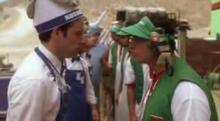The Israeli-Palestinian conflict isn't exactly the richest source of levity and entertainment in the world. Most of the humor related to it relies on shock value to deliver its commentary, which unfortunately removes the heart from the true human struggle of those caught in the middle. West Bank Story, a musical comedy short by Ari Sandel and Kim Ray, manages to present the street-level sentiments of the conflict that, while occasionally goofy, still goes a long way to identify the common bonds of people on both sides.
West Bank Story follows a narrative tradition that is older than the Israeli-Palestinian conflict itself. It is a miniature (in spirit) adaptation of the classic musical West Side Story, itself an update of Shakespeare's Romeo and Juliet, which in turn is an update of the ancient Greek tragedy of Pyramus and Thisbe. In West Bank Story, an IDF soldier named David harbors a secret, mutual love for a Palestinian cashier at a falafel stand named Fatima. David watches from his guard post as two competing falafel businesses become increasingly antagonistic, threatening to explode into a small street war at any moment.
Though this conceit is designed to be cute and even cartoonish, it has more than just a kernel of truth to it. The fact that the conflict between Kosher King and Hummus Hut surrounds falafel, a common cultural bond of both the Israelis and Palestinians, alludes to the larger shared heritage of the belligerent parties. Through the smiles, the funny costumes and the tongue-in-cheek musical numbers there is a strong case for the path to peace.
Thankfully, West Bank Story doesn't share the tragic ending of the stories that inspired it. The closing moments find both restaurants in smoldering ruins, a not-so-subtle metaphor for the entire region. The truth is that, both literally and figuratively, Israel-Palestine is a mess and maybe the only way to rebuild is for both sides to take what little remains and learn to work together.
West Bank Story has its fun moments, but it's tempered by the real horrors alluded to in microcosm throughout the film. The building of walls, the racist stereotypes and the heavy-handed peacekeeping remain in the narrative. Perhaps the most striking joke is an almost too subtle moment when David, distracted by the petty conflict of the competing falafel stands, allows a masked, bomb-carrying terrorist to slip past his guard post.
West Bank Story received some international recognition at the 2007 Academy Awards where it won for Best Live Action Short Film. At just over 21 minutes, it is an entertaining excursion, but also a good centerpiece for an academic discussion of the present and future of Israel-Palestine. At best, a movie like this can act as a springboard to a conversation concerning the disparity between the everyday individuals caught up in the conflict and the people in power who perpetuate it.
To use terms laid out in West Bank Story, everybody wants lunch and everybody wants to be loved. The ongoing wars in the Middle East, whether we call them wars or not, distract people from the hard facts of common suffering. The best our generation can do in the region is tend to the simple essentials with as little fighting as possible. From there, maybe a lasting peace can grow.
